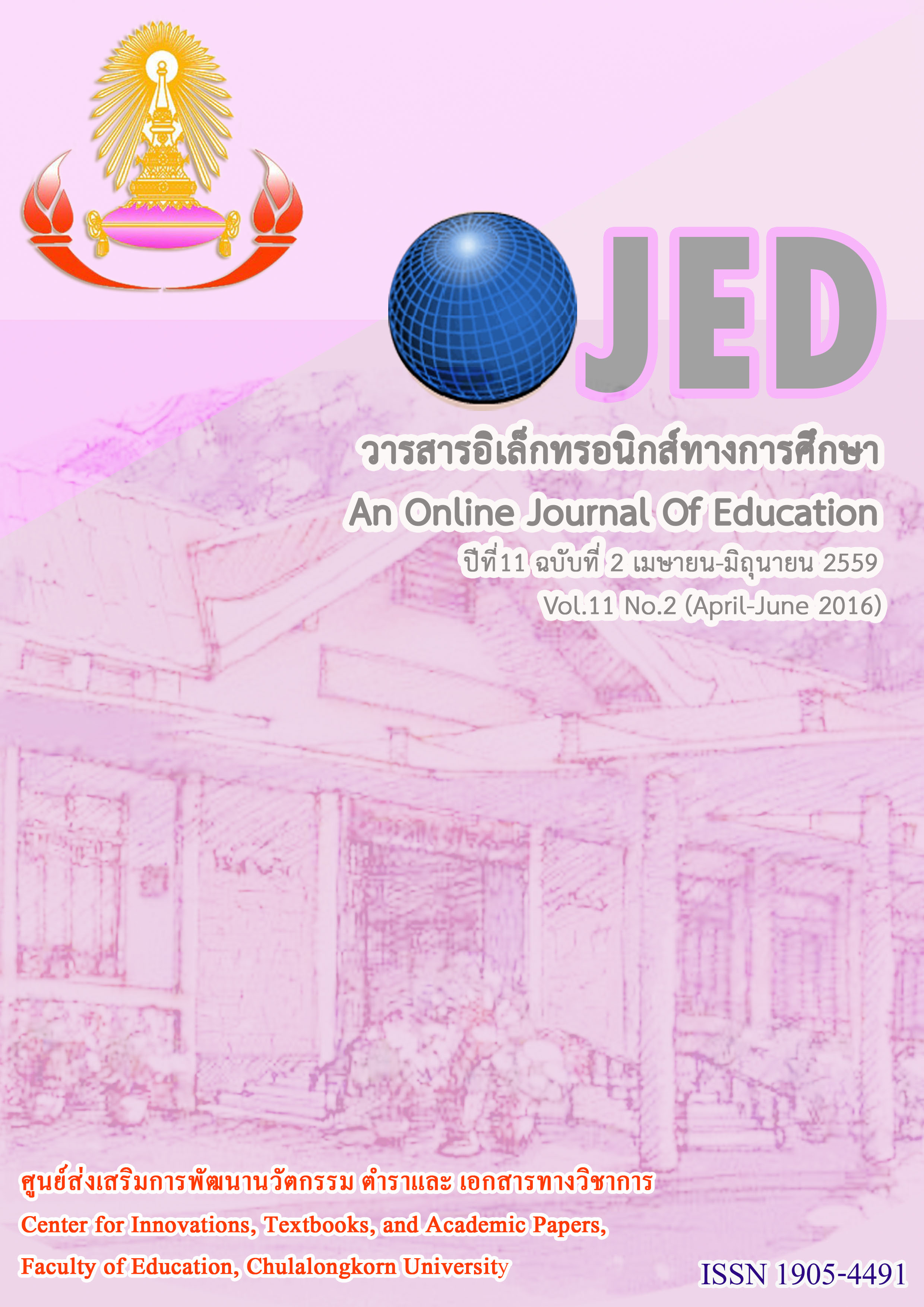โมเดลสมการเชิงโครงสร้างแบบกลุ่มสัมพันธ์ระหว่างความรู้ด้านการสอน ความเชื่อมั่นในตนเองด้านการสอน และแรงจูงใจในการสอนของครูพี่เลี้ยงและนิสิตฝึกสอน DYADIC SEM OF KNOWLEDGE IN TEACHING SELF-EFFICACY IN TEACHING AND MOTIVATION-TO-TEACH OF MENTOR TEACHERS AND...
Keywords:
โมเดลสมการเชิงโครงสร้างแบบกลุ่มสัมพันธ์, ความรู้ด้านการสอน, ความเชื่อมั่นในตนเองด้านการสอน, แรงจูงใจในการสอน, DYADIC SEM, KNOWLEDGE IN TEACHING, MOTIVATION-TO-TEACH, SELF-EFFICACY IN TEACHINGAbstract
การวิจัยครั้งนี้มีวัตถุประสงค์เพื่อเพื่อพัฒนาและตรวจสอบความสอดคล้องของโมเดลสมการเชิงโครงสร้างระหว่างความรู้ด้านการสอน ความเชื่อมั่นในตนเองด้านการสอน และแรงจูงใจในการสอนของครูพี่เลี้ยงส่งผ่านความรู้ด้านการสอน ความเชื่อมั่นในตนเองด้านการสอน และแรงจูงใจในการสอนของนิสิตฝึกสอน ตัวอย่างมี 2 กลุ่ม คือ ครูพี่เลี้ยงในสถานศึกษา และนิสิตฝึกประสบการณ์วิชาชีพชั้นปีที่ 5 จำนวน 244 คู่ จำนวนทั้งสิ้น 488 คน ได้มาโดยวิธีการสุ่มตัวอย่างแบบหลายขั้นตอน เก็บรวบรวมข้อมูลโดยใช้แบบสอบถามประมาณค่า และวิเคราะห์โมเดลสมการเชิงโครงสร้างแบบกลุ่มสัมพันธ์ด้วยโปรแกรม Mplus
ผลการวิจัยพบว่า โมเดลสมการเชิงโครงสร้างแบบกลุ่มสัมพันธ์ระหว่างความรู้ด้านการสอน ความเชื่อมั่นในตนเองด้านการสอน และแรงจูงใจในการสอนที่พัฒนาขึ้นมีความสอดคล้องกับข้อมูลเชิงประจักษ์ (Chi-square (52, N = 488)
= 68. p = .63 RMSEA = .03) โดยความรู้ด้านการสอนของครูพี่เลี้ยงส่งผลต่อความรู้ด้านการสอนของนิสิตฝึกสอน
(B = 0.23, t(487) = 4.27, p < .001) ความเชื่อมั่นในตนเองด้านการสอนของครูพี่เลี้ยงที่ส่งผลต่อความเชื่อมั่นในตนเองด้านการสอนอย่างไม่มีนัยสำคัญทางสถิติ แสดงให้เห็นว่า ครูพี่เลี้ยงที่มีความเชื่อมั่นสูงอาจทำให้นิสิตฝึกสอนเกิดความวิตกกังวล ความกลัว และจนเกิดความเครียด นอกจากนี้ผลการวิจัยยังพบว่า แรงจูงใจในการสอนของครูพี่เลี้ยงส่งผลต่อแรงจูงใจในการสอนของนิสิตฝึกสอนอย่างไม่มีนัยสำคัญทางสถิติ
This research aims to develop and validate the structural equation model among knowledge in teaching, motivation-to-teach, and self-efficacy in teaching of mentor teachers passing the knowledge of teaching, self-efficacy in teaching, and motivation-to- teach to student teachers. The sample consisted of two groups, mentor teachers and 5th year student-teachers. Dyadic data were collected by questionnaires from 224 pairs of mentor teachers and student-teachers. Mplus statistical analysis software packages were used to analyze the dyadic data.
The findings were as follows; the dyadic SEM among knowledge in teaching, motivation-to-teach, and self-efficacy in teaching was fit with the empirical data (Chi-square (52, N = 488) = 68.
p = .63 RMSEA = .03), indicating that the knowledge in teaching of mentor teachers had an effect on the knowledge in teaching of student-teachers (B = 0.23, t(487) = 4.27, p < .001). While the self-efficacy in the teaching of mentor teachers affected the self-efficacy of student-teachers are not statistically significant, suggests that high self-efficacy in the teaching of mentor teachers may cause student-teachers’ anxiety, fear and nervousness. In addition, the research has found that the motivation-to-teach of mentor teachers affects the motivation-to- teach of the student-teachers were not significant statistically.




